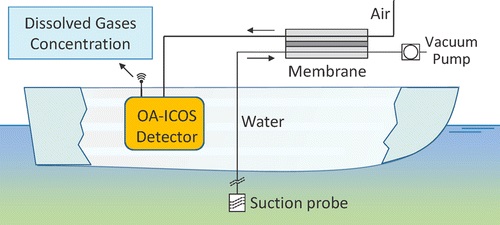In Situ Measurement of Dissolved Methane and Carbon Dioxide in Freshwater Ecosystems by Off-Axis Integrated Cavity Output Spectroscopy
應用LGR OA-ICOS技術原位測量淡水生態(tài)系統(tǒng)中的溶解性氣體:CH4和CO2
Rodrigo Gonzalez-Valencia,? Felipe Magana-Rodriguez,? Oscar Gerardo-Nieto,?
Armando Sepulveda-Jauregui,? Karla Martinez-Cruz,?,? Katey Walter-Anthony,? Doug Baer,§?and Frederic Thalasso*,?,?
?Biotechnology and Bioengineering Department, Cinvestav, Avenida IPN 2508, Mexico City, San Pedro Zacatenco, D.V. 07360,
Mexico
?Water and Environmental Research Center, University of Alaska Fairbanks, Fairbanks, Alaska 07360, United States
§ Los Gatos Research, Inc., Mountain View, California 94041, United States

Abstract
A novel low-cost method for the combined, real-time, and in situ determination of dissolved methane and carbon dioxide concentrations in freshwater ecosystems was designed and developed. This method is based on the continuous sampling of water from a freshwater ecosystem to a gas/liquid exchange membrane. Dissolved gas is transferred through the membrane to a continuous flow of high purity nitrogen, which is then measured by an off-axis integrated cavity output spectrometer (OA-ICOS). This method, called M-ICOS, was carefully tested in a laboratory and was subsequently applied to four lakes in Mexico and Alaska with contrasting climates, ecologies, and morphologies. The M-ICOS method allowed for the determination of dissolved methane and carbon dioxide concentrations with a frequency of 1 Hz and with a method detection limit of 2.76 × 10(-10) mol L(-1) for methane and 1.5 × 10(-7) mol L(-1) for carbon dioxide. These detection limits are below saturated concentrations with respect to the atmosphere and significantly lower than the minimum concentrations previously reported in lakes. The method is easily operable by a single person from a small boat, and the small size of the suction probe allows the determination of dissolved gases with a minimized impact on shallow freshwater ecosystems.
下載原文: